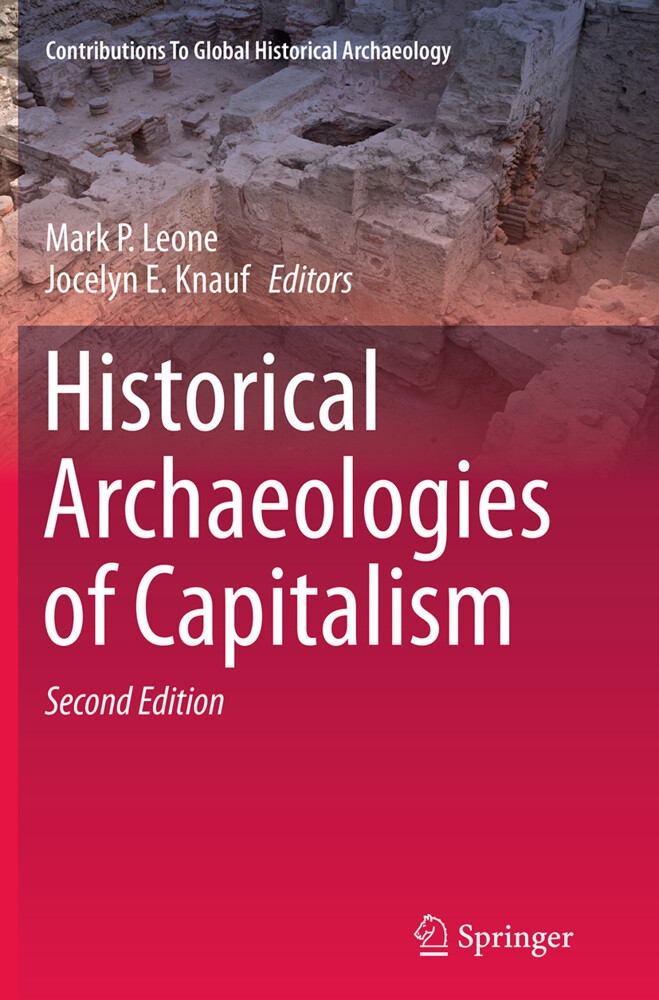
Zustellung: Sa, 18.01. - Di, 21.01.
Versand in 2 Tagen
VersandkostenfreiBestellen & in Filiale abholen:
This new edition of Historical Archaeologies of Capitalism shows where the study of capitalism leads archaeologists, scholars and activists. Essays cover a range of geographic, colonial and racist contexts around the Atlantic basin: Latin America and the Caribbean, North America, the North Atlantic, Europe and Africa. Here historical archaeologists use current capitalist theory to show the results of creating social classes, employing racism and beginning and expanding the global processes of resource exploitation. Scholars in this volume also do not avoid the present condition of people, discussing the lasting effects of capitalism's methods, resistance to them, their archaeology and their point to us now.
Chapters interpret capitalism in the past, the processes that make capitalist expansion possible, and the worldwide sale and reduction of people. Authors discuss how to record and interpret these. This book continues a global historical archaeology, one that is engaged with other disciplines, peoples and suppressed political and economic histories. Authors in this volume describe how new identities are created, reshaped and made to appear natural.
Chapters in this second edition also continue to address why historical archaeologists study capitalism and the relevance of this work, expanding on one of the important contributions of historical archaeologies of capitalism: critical archaeology.
Inhaltsverzeichnis
Introductions
Chapter 1. Jocelyn E. Knauf- Where Historical Archaeologies of Capitalism Are?
Chapter 2. Alison Wylie (from 1999 edition) - Why Should Historical Archaeologists Study Capitalism? The Logic of Question and Answer and the Challenge of Systemic Analysis.
Chapter 3. Mark P. Leone - How Can there be No History?
North America
Chapter 4. Jocelyn E. Knauf - What does Womanhood have to do with Capitalism? : Normalized domesticity and gender differentiation in Annapolis, MD, 1870-1930
Chapter 5. Michael P. Roller - Agamben s State of Exception and the Lattimer Massacre: historical archaeology of violence and capital in the 20th Century.
Chapter 6. Adam Fracchia and Stephen A. Brighton - Crushed Limestone and Ironstone: Labor Relations and Industry in a Nineteenth and Twentieth-Century Quarry Town
Chapter 7. Amanda Tang - The Invention of Race on American Plantations: Food Remains from the Wye House SlaveQuarters on Maryland' s Eastern Shore
Chapter 8. Stacey Lynn Camp and Laura Ng - An Archaeological Examination of Economic Networks at Japanese American Internment Camps
Chapter 9. John Molenda [Overseas Chinese Railroad Camps in Nevada]
Chapter 10. Daniel O. Sayers - Capitalistic Estrangement Can Be Undermined through Praxis: Past-Forward Learning through Archaeology in the Diasporic Great Dismal Swamp, 1600-1860
North Atlantic, Scandinavia, and Ireland
Chapter 11. George Hambrecht The Colonization of the North Atlantic
Chapter 12. Gavin Lucas [The Historical Archaeology of Capitalism in Iceland]
Chapter 13. Bjorner Olsen [Capitalism and its Devastated Landscapes: Iceland and the North Atlantic]
Chapter 14. Jonas Nordin Constructing Industrial Space in the North: Commodification of Man and Nature in 17
th
century Sápmi (Sweden)
Chapter 15. Laura McAtackney Archaeological insights into a peace process: lived experiences of post-Troubles Northern Ireland
Latin America
Chapter 16. Samuel Sweitz [The Impact of Capitalist Systems of Production and Ideologies on the Production and Organization of Space and Place in Latin America]
Chapter 17. Cristobal Gnecco Engaging Capitalism and Modernity from Alternative Conceptions of Time and Materiality: A Case Study from Columbia.
Africa
Chapter 18. Carmel Schrire The Historical Archaeology of the VOC (Dutch East India Company with official sites between Africa and Japan)
Chapter 19. Alfredo González-Ruibal An Archaeology of Predation: Capitalism and the Coloniality of Power in Equatorial Guinea (Central Africa)
Produktdetails
Erscheinungsdatum
29. Oktober 2016
Sprache
englisch
Auflage
Softcover reprint of the original 2nd ed. 2015
Seitenanzahl
508
Reihe
Contributions To Global Historical Archaeology
Herausgegeben von
Jocelyn E. Knauf, Mark P. Leone
Verlag/Hersteller
Produktart
kartoniert
Abbildungen
XV, 489 p. 104 illus., 69 illus. in color.
Gewicht
762 g
Größe (L/B/H)
235/155/28 mm
Sonstiges
Paperback
ISBN
9783319330617
Entdecken Sie mehr
Pressestimmen
The volume benefits from numerous chapters authored by researchers not based in North America, and the editors efforts to be inclusive to global archaeologies of capitalism are applauded. the chapters in the second edition, much like the first, are well-formed narratives on capitalism, making this volume a significant contribution to the field. (Todd M. Ahlman, American Antiquity, Vol. 82 (1), 2017)
This volume invites the reader to a critical understanding of capitalism and is thus a most useful reading for all those interested in the historical archaeology of modernity. (Pedro Paulo A. Funari, Antiquity, Vol. 90 (351), June, 2016)
Offers a stunning range of high-quality, cutting edge contributions to the archaeology and history of capitalist processes. The book continues Leone' s longstanding concern with the social effects of archaeology in the present, and how to best cultivate critical insights among various publics. this book is a must-read for theoretically-informed historical archaeologists and it provides an impressive array of topics and settings that could illustrate much of the range of historical archaeological concerns in the classroom. (Kurt A. Jordan, Historical Archaeology, Vol. 50 (4), 2015)
Bewertungen
0 Bewertungen
Es wurden noch keine Bewertungen abgegeben. Schreiben Sie die erste Bewertung zu "Historical Archaeologies of Capitalism" und helfen Sie damit anderen bei der Kaufentscheidung.










